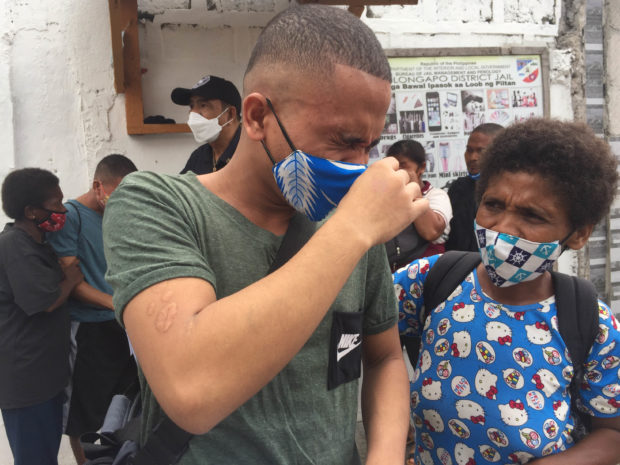Gov’t loses landmark terror case vs 2 Aetas

FREE AT LAST Junior Ramos, 19, is comforted by his mother, Anna, shortly after his release from detention in Olongapo City on Monday. Charges in relation to the Anti-Terror Act of 2020 filed against Ramos and his brother-in-law, Japer Gurung, 30, (partially hidden behind him), were dismissed by a local court due to insufficiency of evidence. —JOANNA ROSE AGLIBOT
OLONGAPO CITY—A regional trial court here has dismissed a terrorism case filed last year against two Aeta tribesmen, whom critics of Republic Act No. 11479, or the Anti-Terror Act of 2020, regard as the first casualties of the controversial law.
In an order dated July 15 and released by Olongapo Regional Trial Court Branch 97 on Monday, Judge Melani Fay Tadili dismissed the terrorism charges against Japer Gurung, 30, and his brother-in-law, Junior Ramos, 19, and ordered their immediate release from the Bureau of Jail Management and Penology (BJMP) facility here.
Tadili said in her nine-page decision that the prosecution “failed to discharge the burden of proving the identities of accused as perpetrators of the crime [of terrorism].”
“Masayang masaya po ako (I’m very happy),” an emotional Gurung said as he and Ramos emerged from the BJMP facility together with their families and lawyers on Monday afternoon.
Gurung and Ramos, both farmers in San Marcelino town in Zambales province, also expressed their gratitude to those who helped them in their case.
They were initially represented by the National Union of Peoples’ Lawyers (NUPL) when they were charged in November last year, in connection with an encounter on Aug. 21 between government troops and suspected communist rebels in Sitio Lumibao, Barangay Buhawen in San Marcelino.
The NUPL said Gurung and Ramos were among the Aetas evacuating their families from their ancestral land in Sitio Lumibao, amid heightened military operations.
But the two tribesmen ended up being charged with killing a soldier.
They pleaded not guilty to the charges and accused the military of torturing them.
“The torture they were made to endure and their forced feeding with their own feces while they were in military custody for six days are on record and contained in their counter-affidavits that the NCIP (National Commission on Indigenous Peoples) itself had prepared for them,” Bonifacio Cruz, one of the three original NUPL lawyers for Gurung and Ramos, said in a previous interview with the Inquirer.
Last February, they suddenly terminated the NUPL’s services after the NCIP visited the detained Aetas here.
Gurung and Ramos were subsequently represented by government lawyers of the Public Attorney’s Office (PAO), and in a press conference at the BJMP on Feb. 10, they said the PAO was their preferred counsel and even described the NUPL as being a “burden to our case.”
A day earlier, the Supreme Court denied Ramos and Gurung’s petition against the terror law—which they had filed on the urging of the NUPL—after Solicitor General Jose Calida informed the high court that they had withdrawn their petition, which was one of many that had been filed questioning the constitutionality of the law.
Demurrer to evidence
With the government taking over the defense, lawyer Collins Coloma of the PAO then filed a demurrer to evidence—or motion to dismiss the case on the ground of insufficiency of evidence—after noting the failure of the provincial prosecutor of Zambales to even establish the identities of the accused.
The prosecution presented as witnesses two Army officers, Second Lieutenants Fritz Entoma and Ian Dominic Oran of the Army’s 73rd Division Reconnaissance Company, based in Fort Magsaysay, Nueva Ecija province.
Coloma said “the absence of positive identification renders the arrest of the accused and the search and seizure of the [firearms] from them doubtful.”
The court noted further the “blatant inconsistency” in the soldiers’ testimonies and sworn affidavits.
It said the two soldiers’ testimonies “were inconsistent with the limited opportunity … to see the accused before the commission of the crime.” It also cited the fact that “several [other] persons committed the crime.”
“They (the two soldiers) testified that they saw the accused during the gunfight. If they did see the accused, they could have easily said so in their sworn affidavits as they did in their judicial affidavits,” the court said.
“[T]he soldiers did not know the accused, [that] both are Aetas who share with other Aetas common physical characteristics of dark skin tones, short statures and curly hair. They saw them for the first time on the day the gunfight happened,” the court pointed out further.
The court also ruled as “unlawful” the warrantless arrest of Gurung and Ramos.
This invalidated the search warrant carried out in their homes and led to the dismissal of the illegal possession of firearms charges against the two.
“The invalidity of an arrest leads to several consequences, one of which is any search incident to the arrest becomes invalid, thus rendering the evidence acquired constitutionally inadmissible,” the court said.
The NUPL welcomed what it called Ramos’ and Gurung’s “rightful acquittal.”
‘Pawns’
NUPL president Edre Olalia said it was unfortunate that the two had to deal with “trumped-up charges” and endured “horrible and unimaginable torture, which remains undisputed to this day.”
“[They were] made pawns by the very state that put them in jail in the first place and whose self-righteous agents even brazenly committed unethical conduct to snatch them away from their original counsel to defuse the focus on the patent injustice on them,” he added.
In a statement, Bayan Muna Rep. Eufemia Cullamat said: “This (the case against Gurung and Ramos) is proof that the antiterror law is dangerous because the victims are the most vulnerable groups like the indigenous tribes.”
She commended the PAO lawyers in the defense panel, whom she described as competent and with high integrity.